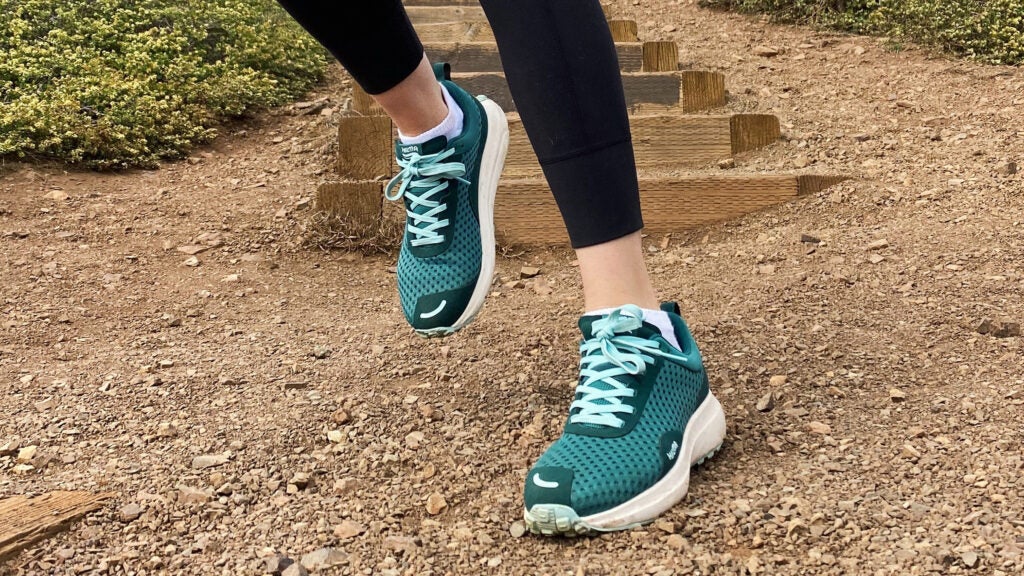No products in the cart.
Outdoor Adventure
New Running Shoe Brand Hilma to Offer 45(!) Sizes for Women
Outside’s long reads email newsletter features our strongest writing, most ambitious reporting, and award-winning storytelling about the outdoors.
A new, women’s-specific running shoe brand called Hilma promises to deliver “a new level of comfort to women runners unlike anything that exists,” according to founder Brooke Torres. The company, backed by ex-executives from brands like Nike and RunKeeper, is using a novel fit model combined with a personalized online evaluation to deliver shoes that it claims will feel customized to each runner.
Torres first came up with the idea for the brand after getting golf ball-sized blisters from running a half-marathon in ill-fitting shoes on a humid day.
“It’s tricky to find the right fit,” says Torres. Learning how many other people—women, especially—had the same problem spurred her to redefine how runners shop for shoes.
“When I started running and racing, people would always ask me, ‘What is the best running shoe?’” says Torres. “There is no such thing. It totally depends on you, and fit is a huge part of that.”
Torres is spot-on with her assessment. While we select the best running shoes twice a year in our Buyer’s Guides, based on their innovative technology and high evaluation marks from a wide range of our shoe testers, every runner will have a different experience in each shoe. If the shoe doesn’t fit, don’t wear it. But finding one that matches your feet can be challenging.
To date, just a few brands have come out with running shoe models specifically and exclusively for women. Lululemon’s Blissfeel debuted in Spring 2022. Puma’s women’s-specific model, the Run XX Nitro, also debuted in Spring 2022. Some brands, like Altra, have featured women’s lasts, or 3D-molded foot shapes, in all their women’s models for years. But most shoe companies use a gender-neutral last in women’s sizes (which are usually based on the male foot). All of Hilma’s lasts are designed around women’s feet.
Similarly, only a handful of brands offer various widths in their running shoes—New Balance is one of the few known for its wide offerings. But, says Torres, Hilma is doing things differently. “The language of narrow, medium, and wide doesn’t segment the foot into the right ways,” she says.
While other shoe companies offer anywhere from 10 to 14-or-so size options, Hilma’s 45 different size variations will take into account foot length (sizes 5 to12 with half-sizes), general foot shape, specific dimensions like a longer second or third toe, and volume of feet. Each size will be available in one of three lasts.

The shapes will be called “Fit 1,” “Fit 2,” and “Fit 3.” Fit 1 will have a narrower heel hold, narrower midfoot hold, and narrower toe box. Fit 2 will retain the narrower heel hold and midfoot hold, but feature a wider toe box fit, which better accommodates a more rectangular toe shape. Fit 3 will boast a wider heel hold, wider midfoot, and wider toe box, accommodating a more full-volume foot—which, says Torres, “works well for people with longer second toes and also provides room for bunions” (Fit 3). The combination of length sizes and three fits multiplies to 45 total options.
Hilma is debuting one model—a neutral, cushioned road-to-trail shoe with a 6mm drop and a moderate stack height of 29 (heel) or 23 (forefoot)—in all possible size and shape options.
To help runners navigate this wealth of fit choices, consumers will be able to fill out a questionnaire online, similar to the Thirdlove Bra “Fitting Room,” says Torres. Runners will answer questions about their experiences with other shoe brands, how products generally fit, if they tend to have heel slip, if they crave more room in the toe box, and more. At the end, the survey will generate the recommended Hilma size and fit. From there, customers can choose one of three colors: Evergreen, Mirage Grey, or Purple Rose.
The brand’s single, neutral model is meant to have cross-over versatility. The rubber outsole features four millimeter lugs that are shallow enough to run smoothly on roads, yet toothy enough to provide traction on non-technical trails.
“I really wanted to enable spontaneity with [the shoe],” says Torres. “You can check out a trail that intrigues you, while still having good road grip.”
The brand’s name, Hilma, was inspired by an “incredible and challenging” racing experience Torres had in Iceland. The Nordic woman’s name, she says, evokes feelings of adventurous women and appreciating the outdoors year-round for her.
Eventually, Hilma may offer more customization options, like support under the arch, different stack heights, and, potentially, men’s running shoes with the same personalized fit options.
But, says Torres, “I really am focused on serving women’s fit first, and going from there.”
Source link

